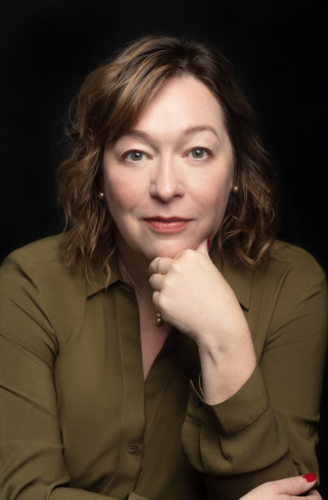While thinking of Adam’s death, she hears about Jon’s,just last week, an old flame, the composer. Their endingso painful that a decade later, when buying her new home,she wavered because it was by a street with his last nameand wasn’t sure she could stomach walking bythat name every day. Which is what she does nowto take in the news, take a walk, it’s what she didwhen Adam died, end of last winter. It’s whatshe did when Josh died, too, that holiday weekend,everyone out of town, so much ice on the sidewalkno choice but to walk in the middle of the road,using her red scarf as a tissue, ice caking her lashes.It’s blinding outside and the snow’s a canvassoaking up pigments mixed by the sun, blues, purples,yellows, pinks and orange. The sun dazzlesthe melting stalactites studding the rooftops. It wasa nearly perfect affair, they worked in the mornings,she drank too much coffee and let a cigarette burn so longits ash would spill onto the page and that wasone happiness. Another was late afternoonswhen she’d join him in bed, and then after, it would betime for an aperitif and they’d cook dinner, eat,discuss their days. Some nights he’d go back to the pianoand play Scarlatti while she stood behind him with her armsaround his shoulders light enough, she imagined,not to hinder his playing. Still it ended badly, suddenly,irrevocably. It’s the same walk she takes each time,from her house to Brooks Street, Brooks to the Genesee,then along the river until it meets the Erie Canal, thenunder the highway, then into the forest unlessthe little alarm of fear sounds in her, it often does,a woman alone. The day she learned about Adam,she’d stopped on the bridge crossing the riverto take out her phone for a photo, saw the text.She could find another walk, but she doesn’t want to,she doesn’t want to get in the car to avoid the walk,avoid the death, avoid the river. This is the walkby her house, by the street with Jon’s name, it’sthe walk along the river that’s hazel-green in summer,silver-blue in spring, frozen sometimes in winter.A walk is a poem. So is a grief.When she gets home, the snow on her boots smearslike paint on the doormat. She finds the cats asleepon the table they’re supposed to stay off of,the patch of light they always seek makes their warm furgleam. There’s a word for it, she just read it today, apricity,recorded by Cockeram in 1623, “the warmenessof the Sunne in Winter,” now obsolete.
The Morning Will Be Bright, and Wrong
Feature Date
- September 27, 2023
Series
Selected By
Share This Poem
Print This Poem
“The Morning Will Be Bright, and Wrong” from Still Falling by Jennifer Grotz.
Published by Graywolf Press on May 2, 2023.
Copyright © 2023 by Jennifer Grotz.
All rights reserved.
Reproduced by Poetry Daily with permission.

Jennifer Grotz is the author of four books of poetry, most recently Still Falling (Graywolf Press, 2023). Also a translator from the French and Polish, her newest translation is Everything I Don’t Know, the selected poems of Jerzy Ficowski, co-translated from the Polish with Piotr Sommer (World Poetry, 2021). Her poems, reviews, and translations have appeared in The New Yorker, Poetry, The Nation, The New Republic, New York Review of Books, Ploughshares, New England Review, and in five volumes of the Best American Poetry anthology. The recipient of a Rona Jaffe Foundation Writers’ Award, Grotz has also received fellowships from the National Endowment for the Arts and the Guggenheim Foundation. Director of the Bread Loaf Writers’ Conferences, she teaches at the University of Rochester.
“Still Falling is an undeniably gorgeous book of love poems full of grief. In these pages, Jennifer Grotz writes line after line of direct statement in rhythms that would leave any reader breathless and wanting more. . . . I am in awe of Grotz’s power to grow and transform book after book. I cannot read Still Falling without crying.”—Jericho Brown
Poetry Daily Depends on You
With your support, we make reading the best contemporary poetry a treasured daily experience. Consider a contribution today.




